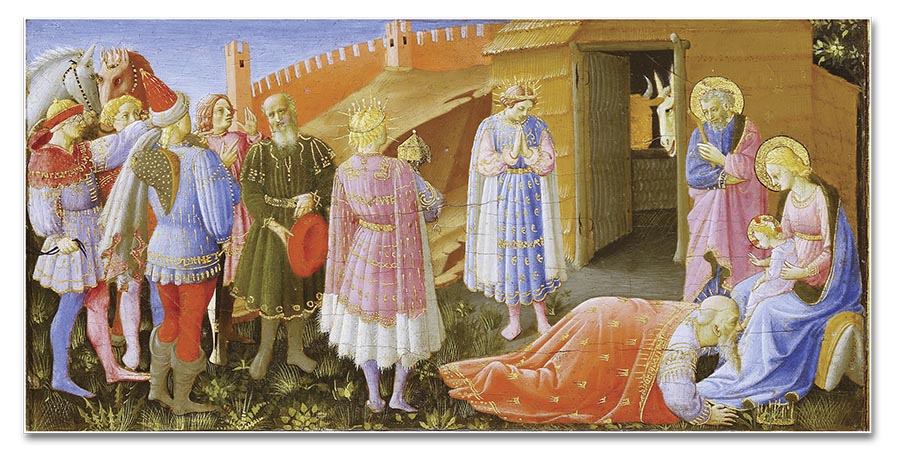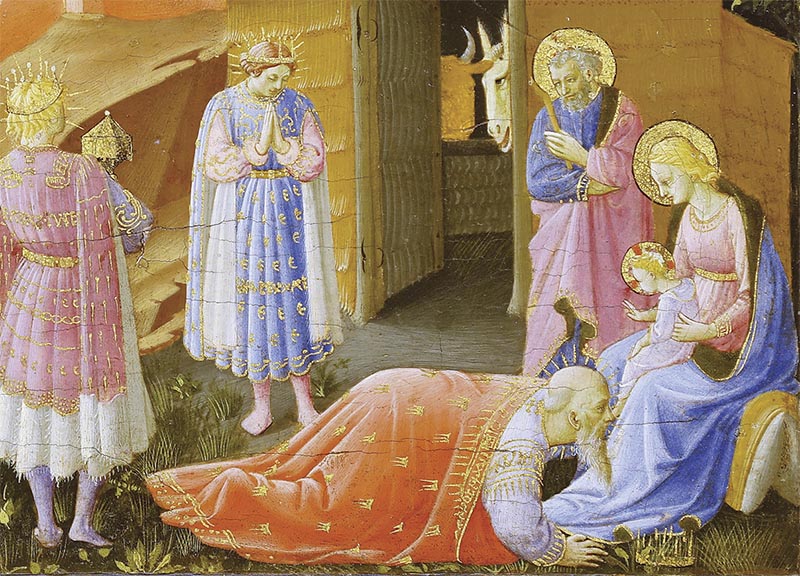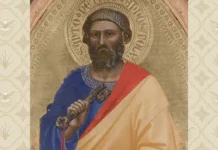The three Wise Men did not see the Child ruling over demons or raising the dead. Rather, they found a child placed in the care of his Mother. In this way, what the sound of His voice did not yet proclaim, the simple sight of Him taught them.
The remembrance of the actions performed by the Saviour of the human race will be of great help to us, dear brethren, if we make this object of our Faith the ideal for our imitation.
Indeed, within the sequence of Christ’s mysteries, the very miracles are graces and stimuli which reinforce doctrine, so that we may imitate with the example of works what we confess in the spirit of Faith. For even these first moments of the life of the Son of God born of the Virgin Mother teach us to grow in piety.
Upright hearts see appearing there simultaneously, in one Person, the lowliness proper to humanity and the majesty proper to divinity. The One whom the cradle attests to being a child, Heaven and the heavenly spirits proclaim as their Creator.
This little child is the Lord and Master of the world; the One whom nothing can contain reposes in the crook of His Mother’s arm. But this is where the healing of our wounds and our restoration lie, because human nature could not have been reconciled with God if two such diverse realities had not come together to unite.
Jesus’ life began and ended under persecution
The remedy that was given to us thus became the rule of life, and from what was given as medicine to those who were dead a standard of morality emerged.
It was with good reason, then, that when the brightness of a new star had led three wise men to worship Jesus, they did not see Him ruling over demons, raising the dead, restoring sight to the blind or mobility to the lame or speech to the dumb, or in any other action of divine power. They saw Him, rather, as a Child – silent, at rest, placed in the care of His Mother.
In Him there appeared no indication of power, but rather the prodigy of His humility. Consequently, the mere sight of that Sacred Infancy to which God the Son of God had adapted himself brought to their eyes a preaching that would later be imparted to their ears. What the sound of His voice did not yet proclaim, the simple sight of Him taught them.
For the entire victory of the Saviour, the one that overcame the devil and the world, began in humility and ended in humility. Its appointed time began under persecution and ended under persecution. Neither the endurance of suffering was lacking to the child, nor the gentleness of a child to the one who would suffer. For, the Only-begotten Son of God undertook by a single inclination of His majesty both the will to be born as a man and the ability to be killed by men.
Almighty God, therefore, made our exceedingly bad situation good through His unique lowliness and destroyed death along with the author of death. He did not refuse anything that His persecutors imposed upon Him. In obedience to the Father, He bore the cruelties of his executioners with the meekest docility.
Christ loves true and willing humility
How humble we ought to be, then, how patient, we who, when we meet with any distress, never undergo anything we do not deserve!
“Who can say, ‘I have made my heart clean; I am pure from my sin’?” (Prv 20:9). Blessed John says, “If we say we have no sin, we deceive ourselves, and the truth is not in us” (1 Jn 1:8). Who will be found so free from guilt that they have not in themselves anything for justice to condemn or mercy to forgive?

Consequently, dearly beloved, the whole rule of Christian wisdom consists not in abundance of words, not in cleverness at disputing, not in desire for praise and glory, but in a true and willing humility. This is what the Lord Jesus Christ chose and taught from within the womb of His Mother right up to His torment on the Cross – by enduring everything with fortitude.
When the disciples, as the Evangelist says, were arguing among themselves about who among them would be greater, Jesus took a small child and placed him in the midst of them, and said: “Truly, I say to you, unless you turn and become like children, you will never enter the Kingdom of Heaven. Whoever humbles himself like this child, he is the greatest in the Kingdom of Heaven” (Mt 18:3-4).
Christ loves the Childhood that He first took up in both soul and body. Christ loves childhood, the teacher of humility, the rule of innocence, the image of gentleness. Christ loves childhood, to which He directs the characters of older people, to which He brings back old age. Those whom He would raise up to an eternal Kingdom He disposes to follow His own example.
Similar to children in their want of evil
However, if we wish to fully understand how it is possible to achieve such an admirable transformation and how to return to the state of a child, let us take St. Paul as teacher. He tells us: “do not be children in your thinking; be babes in evil, but in thinking be mature” (1 Cor 14:20).
It is, then, not a matter of returning to the toys and weaknesses of childhood, but of imitating certain things which are also befitting to maturity. For example, that our inner turmoil may soon pass and we quickly recover peace; that we may not hold a grudge for the offences we have received, nor may we strive for high offices; that we may enjoy being together and maintain our spiritual composure.
It is a great quality not to know how to do harm or to plot evil, because the cunning of this world consists in insulting and replying to insults; on the contrary, not returning evil for evil (cf. Rom 12:17) is proper to the equanimity of Christian childhood.
The mystery we celebrate today, dear brethren, invites you to bear this resemblance to children. This is the form of humility that the Infant Saviour teaches you by being adored by the Magi. And to show us the trophy which He reserves for His imitators, Jesus glorified with martyrdom those who came into the world concurrently with Him. Born in Bethlehem, like Christ, they were associated with Him by age and by their holocaust.
Let the faithful therefore love humility and above all flee from all pride. Let each one give preference to his brother; let no one seek his own personal gain but rather that of his neighbour (cf. 1 Cor 10:24).
When all are filled with mutual feelings of love, the poison of envy will disappear, “For every one who exalts himself will be humbled, and he who humbles himself will be exalted” (Lk 14:11). This is the testimony given by Our Lord Jesus Christ himself, who with the Father and the Holy Spirit lives and reigns for ever and ever. Amen. ◊
POPE ST. LEO THE GREAT. Sermon VII
On the Epiphany of the Lord: SC 22, 276-283







